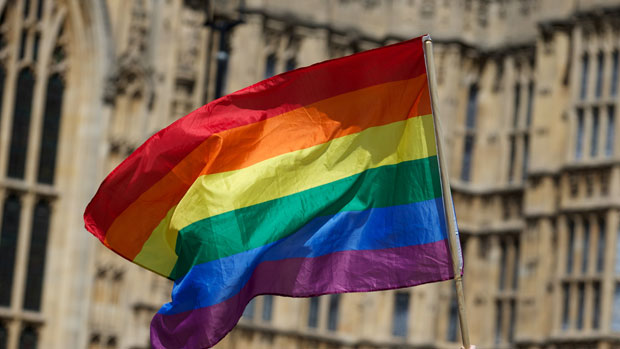A timeline of gay rights in the UK
From death by hanging to the era of marriage equality

A free daily email with the biggest news stories of the day – and the best features from TheWeek.com
You are now subscribed
Your newsletter sign-up was successful
Fifty years ago, the Sexual Offences Act 1967 came into effect. The act, which decriminalised homosexual sex acts between consenting men over the age of 21, opened the door to a slew of legal and social changes which would transform the way British society viewed same-sex relationships over the next 50 years.
Here are some of the key dates in the history of gay rights in the UK:
1533: The Buggery Act, the first ever law to specifically outlaw anal sex, was signed into English law. The text of the act described "buggery" as a "detestable and abominable Vice", punishable by death whether committed with "mankind or beast".
The Week
Escape your echo chamber. Get the facts behind the news, plus analysis from multiple perspectives.

Sign up for The Week's Free Newsletters
From our morning news briefing to a weekly Good News Newsletter, get the best of The Week delivered directly to your inbox.
From our morning news briefing to a weekly Good News Newsletter, get the best of The Week delivered directly to your inbox.
Walter Hungerford, 1st Baron Hungerford, was the first person to be executed under the Buggery Act in 1540, although Historic England claims the charges were most likely "politically motivated", given that Hungerford was also accused of treason and witchcraft.
1835: James Pratt and John Smith became the last men in Britain to be executed for homosexual acts. The two labourers had met a third man in a tavern and gone to his rented room, where the landlord claimed to have caught them engaged in "buggery". They were hanged at Newgate prison, London.
Buggery ceased to be a capital crime in 1861, when the Offences Against the Person Act 1861 downgraded the punishment to life imprisonment in England and Wales. Scotland followed suit in 1889.
1885: The Criminal Law Amendment Act 1885 came into law. The act's main purpose was to protect girls from sexual exploitation by raising the age of consent to 16, but another provision in the act criminalised "gross indecency", which in practice extended existing laws against "buggery" to criminalise all sex acts between men.
A free daily email with the biggest news stories of the day – and the best features from TheWeek.com
1895: Author Oscar Wilde's ill-advised attempt to sue the father of his lover, Lord Alfred Douglas, for publicly accusing him of being a "sodomite" resulted in the writer himself being put on trial.
Wilde was convicted of "gross indecency" with Douglas under the 1885 Act, and sentenced to two years' hard labour - the maximum sentence allowed by the law.
Physically ruined by the harsh prison regimen and impoverished by legal fees, Wilde died in 1900, three years after his release.
1955: Peter Wildeblood, a journalist convicted of buggery and sentenced to 18 months in Wormwood Scrubs, published Against the Law, a book detailing his persecution at the hands of the law, which helped to normalise the taboo subject of same-sex relations. The same year Wildeblood was the only openly gay man to testify before Lord Wolfenden's inquiry, which would ultimately recommend the decriminalisation of homosexuality.
1957: The Wolfenden committee published its report, based on three years of testimony from police, psychiatrists and gay men themselves.
All but one of the committee's 15 members, drawn from the world of politics, law, medicine and academia, agreed that homosexual acts between consenting men over the age of legal majority - 21 at the time - should not be a matter for the law.
1967: The Sexual Offences Act 1967 stipulated that private sex acts between consenting men over the age of 21 would no longer be a criminal offence in England and Wales, although Scotland did not follow suit until 1980 and Northern Ireland until 1982.
Despite cross-party support for the Act, MPs were hardly lining up to accept homosexuality as a legitimate orientation. "Even those supporting decriminalisation called homosexuality 'a disability' and 'a great weight of shame'," says the Huffington Post.
1972: By the early 1970s, "gay rights organisations were springing up locally and nationally," says the Lesbian and Gay Newsmedia Archive. In 1972, upwards of 2,000 gay men and women marched in London's first Pride parade.
1988: Then-Prime Minister Margaret Thatcher introduced an amendment to the Local Government Act 1988 banning state schools from teaching or promoting the "acceptability of homosexuality as a pretended family relationship".
The notorious "Section 28" caused widespread outrage and as the catalyst for a massive surge in gay activism, including the formation of LGBT rights group Stonewall UK. Section 28 was repealed in Scottish law in 2000, and from English, Welsh and Northern Irish law in 2003.
2004: The Civil Partnership Act allowed same-sex couples to enter into same-sex unions with the same rights as married couples.
2014: The Marriage (Same Sex Couples) Act 2013, which recognised same sex marriages, entered into law in England and Wales. Several gay couples were wed at the stroke of midnight on 29 March 2014, when the law officially came into effect.
Scotland legalised gay marriage in December 2014. Gay marriage remains illegal in Northern Ireland.
-
 What is the endgame in the DHS shutdown?
What is the endgame in the DHS shutdown?Today’s Big Question Democrats want to rein in ICE’s immigration crackdown
-
 ‘Poor time management isn’t just an inconvenience’
‘Poor time management isn’t just an inconvenience’Instant Opinion Opinion, comment and editorials of the day
-
 Bad Bunny’s Super Bowl: A win for unity
Bad Bunny’s Super Bowl: A win for unityFeature The global superstar's halftime show was a celebration for everyone to enjoy
-
 Greece legalizes same-sex marriage
Greece legalizes same-sex marriageSpeed Read Greece becomes the first Orthodox Christian country to enshrine marriage equality in law
-
 How are civil partnerships different from marriage?
How are civil partnerships different from marriage?In Depth Theresa May announces that straight couples will now get the right to form civil partnerships